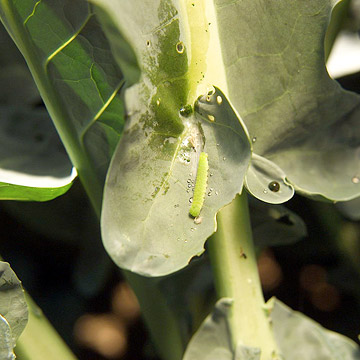






Cabbage loopers are small caterpillars with big appetites. They can be one of the most destructive pests in the vegetable garden. The bugs love plants in the cabbage family, including cabbage, broccoli, cauliflower, kohlrabi, and collard greens. This insect will also attack potato, tomato, spinach, and cucumbers.
The caterpillars look like 2-inch-long small green worms with silvery or white stripes running down their backs. Watch for them any time from spring to fall. The caterpillars are the larval form of the white cabbage butterflies. If you see the adult butterflies around your garden, look closely for their larvae.
They typically eat holes in the leaves and hide out on the bottom side of the foliage. Their green color makes them difficult to detect.
continue reading belowRow covers: In spring, keep the white cabbage butterflies from laying their eggs on the plants with floating row covers. These row covers create a barrier that keeps the insects out but allows air, light, and moisture to reach the plants. You will need to remove the row covers when your vegetable plants grow too large or when the temperatures heat up too much in summer.
Hand picking: You can easily keep small populations of cabbage loopers under control by picking the insects off the plants and dropping them into a bucket of soapy water.
Cleaning up in fall: Be sure to keep your garden clean. The pests often overwinter in garden debris -- so cleaning up your vegetable garden and tilling it each fall will help keep the pest under control.
Attract beneficial insects: Planting flowers, such as marigolds, calendula, sunflower, daisy, alyssum, or dill nearby can attract beneficial insects that attack and kill cabbage loopers and cabbage butterflies.
Bt: Spaying Bt (Bacillus thuringiensis) on plants can help. Bt is a naturally occurring bacterial disease that only attacks caterpillars. Many vegetable gardeners consider Bt an organic product.
Insecticidal soaps: Insecticidal soaps will also kill the caterpillars, but must be applied on a regular basis in heavy infestations as they may not kill any cabbage looper eggs.
Insecticides: A number of insecticides also effectively kill cabbage loopers. Be sure to follow the package directions carefully.
Copyright © www.100flowers.win Botanic Garden All Rights Reserved